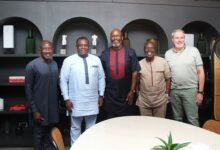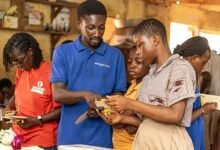Women’s endeavours key to economic growth – Yaw Njorgnab
Yaw Njorgnab, Manager of Agribusiness at Stanbic Bank Ghana, has emphasised the critical role women play in driving economic growth and ensuring the sustainability of the Ghanaian economy.
Speaking at the 2025 Women in Business Dialogue Series held in Accra, he pointed out that no nation could achieve true economic freedom and stability without actively harnessing the potential of women in business and leadership.
Mr Njorgnab noted that empowering women in entrepreneurship was not just a matter of gender equality but an essential economic strategy.
“For any country to achieve sustainable development and economic freedom, the contributions of women cannot be overlooked. Women form a significant part of the workforce, and when given the right tools and opportunities, they have the potential to build thriving businesses that create jobs and boost national productivity,” he stated.
Citing findings from a recent Fortune 500 Report, Mr Njorgnab underscored the proven success of women in business leadership.
He explained that women tend to be more effective managers, exhibiting strong decision-making skills, resilience, and a keen ability to drive sustainable growth in business operations.
“Women-led businesses have consistently demonstrated higher levels of efficiency, financial discipline, and stakeholder value creation. When equipped with the right skills and resources, female entrepreneurs can elevate their businesses to greater heights,” he mentioned.
He further emphasised the importance of diversity in leadership, stating, “Indeed, when women lead businesses, they bring a unique blend of reliability, compassion, and commitment, which ultimately enhances the performance of organisations. Research has shown that companies with higher female representation in leadership tend to be more profitable and socially responsible.”
Mr Njorgnab also called for increased support and inclusion of women in both business and leadership spaces.
He highlighted the ripple effect of greater female participation in economic activities, explaining that it leads to broader societal benefits, including increased tax revenues for the government, enhanced household incomes, and overall economic resilience.
“Where we are as an economy, we need more women in leadership and businesses. Their contributions will create multiplier effects that benefit everyone, from families and communities to the national economy. The government stands to gain through increased tax revenues as more businesses thrive under female leadership,” he elaborated.
Recognising the financial challenges that many female entrepreneurs face, Mr Njorgnab encouraged women in business to actively seek out funding opportunities to support and scale their ventures.
He smentioned that a lack of information often prevents business owners from accessing available financial resources.
“There are numerous grants and funding programmes specifically designed to support women entrepreneurs. Some of these come with minimal or no collateral requirements, yet many women are unaware of their existence,” he observed.
Furthermore, he urged women to explore financing options beyond traditional loans and leverage opportunities such as government-backed grants, venture capital, and impact investment funds that prioritise women-led enterprises
STORIES: KINGSLEY ASARE






